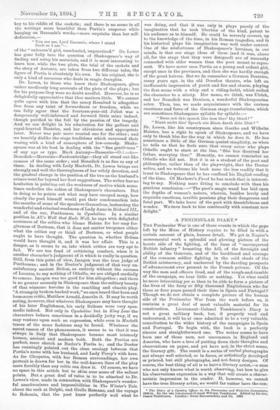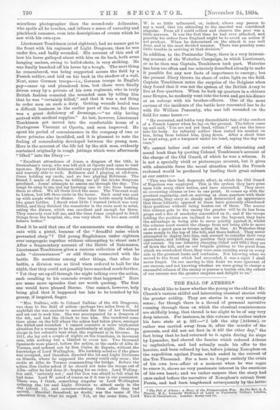A PENINSULAR DIARY.*
THE Peninsular War is one of those events in which the gaps left by the Muse of History require to be filled in with a certain amount of plain, human detail, We get in Napier's monumental work a splendid and glowing picture of the heroic side of the fighting, of the lines of " unconquered British infantry" breasting the hill, of the foresight and ability of the Generals, and of the hardihood and courage of the common soldier fighting in the cold shade of the British aristocracy, and uncheered by the dazzling prospects of advancement ever present to the French private. Of the way the men and officers lived, and of the rough-and-tumble of the campaign, we Lear little or nothing. Yet what could be more interesting per se than to be able to form a picture of the lives of the forty or fifty thousand Englishmen who for three or four years passed their time in Spain and Portugal Though we do not obtain a complete picture of the human side of the Peninsular War from the work before -us, it contains a great deal of most valuable material for its construction. Lieutenant-Colonel Tomkinson's Diary is not a great military book, but, if properly read and understood, it will be at once admitted to be a very valuable contribution to the wider history of the campaigns in Spain and Portugal. To begin with, the book is a perfectly sincere and straightforward one. The writer seems to have been one of those men, not uncommon in England and America, who have a love of putting down their thoughts and observations on paper, and yet have not, in the strict sense, the literary gift. The result is a series of verbal photographs not always well selected, or in focus, or artistically developed or printed, but still photographs, and not fancy designs. Of course, the best thing of all is to have a literary artist,—a man who not only knows what is worth observing, but how to give his observations expression in a way that will create a charac- teristic impression in the reader. If, however, we cannot have the true literary artist, we would far rather have the eon- • The Meru of a Cavalry Officer in the Peninsular and Waterloo Campaigns, isoims. By the .ate Lieutenant-0.4onel William Tomkinaon Edited by his eon. James Tomkineon. Landon: Swan Sonnonsohain and Oa. 1894.
scientious photographer than the second-rate delineator, who spoils all he touches, and infuses a sense of unreality and pinchbeck romance, even into descriptions of events which he saw with his own eyes.
Lieutenant Tomkinson (etat eighteen), had no sooner got to the front with his regiment of Light Dragoons, than he was under fire, and badly wounded. His account of this and of how his horse galloped about with him on its back, both arms hanging useless, owing to bullet-shots, is very striking. He was finally knocked off his horse by a bough. The next thing he remembered, was being supported across the field by a French soldier, and laid on his back in the shadow of a wall.
Next, some German troops—i.e., German troops in English pay—came up and plundered him, but these were finally driven away by a private of his own regiment, who in truly British fashion consoled the wounded man by telling him that he was "certainly killed," and that it was a sad thing to order men on such a duty. Getting wounds healed was a difficult business in the earlier part of the war, for there was a great deficiency of dressings,—" no ship having arrived with medical supplies." At last, however, Lieutenant Tomkinson got moved into the comfortable house of a Portuguese Viscount at Oporto, and soon improved. He spent his period of convalescence in the company of two or three privates also invalided, and it is pleasant to note the feeling of comradeship developed between the young men. Here is the account of the life led by the sick men, evidently contained originally in rough jottings which were afterwards " lifted " into the Diary
Excellent attendance of Jones, a dragoon of the 16th, in Swetenham's troop, who was left sick at Oporto and came to wait upon me. My servant Robinson still very unwell from rheumatism, and scarcely able to walk. Robinson acid I playing at all-fours. Jones holding my cards, and we two playing Robinson. The friend I made of Jones, he telling me 1 the tricks dragoons practised. Jones' attempts to amuse me *rough the day. The songs he sang to me, and my learning one Or two from hearing them so often. We all three lived the same. The Viscount went to Lisbon, but left three cooks in the house. Each meal was sent up with ample wine for dinner. One large bottle nearly holding two quart bottles. I drank what little I wanted (which was very little), and they finished the remainder in the room next to mine, eating the dinner, which was excellent and enough for three. They scarcely ever left me, and the time Jones employed to fetch things from the hospital, etc., was very short. No two men could behave better."
Need it be said that one of the amusements was shooting at
cats with a pistol, because of the " dreadful noise which prevented sleep " ? Did young Englishmen under eighteen ever congregate together without attempting to shoot cats P After a fragmentary account of the Battle of Salamanca, Lieutenant Tomkinson gives a curious collection of what he
calls " circumstances " or odd things connected with the battle. He mentions among other• things, that after• the battle, a division was so tired when ordered to halt for the night, that they could not possibly have marched much further. " Yet they sat up all through the night talking over the action, each recalling to his comrade events that happened." Here are some more episodes that are worth quoting. The first one would have pleased Sterne. One cannot, however, help being glad that it happened too late to be touched by his greasy, if inspired, finger.
" Mrs. Dalbiac, wife to Colonel Dalbiac of the 4th Dragoons, was close to the field of action—perhaps two miles from it. At nightfall she was anxious to ascertain the fate of her husband and set out to seek him, She was accompanied by a dragoon of the 4th, and had the ill-luck to lose him. She wandered some time alone on the bill where the action had taken place, amongst the killed and wounded. 1 cannot conceive a more unpleasant situation for a woman to be in, particularly at night. She always sleeps in her colonel's tent when the regiment is in bivouac. In 1811, she lay out a couple of nights on the tinadiana, in incessant rain, with nothing but a blanket to cover her. Two thousand Spaniards were placed, before the action, in the castle of Alba do `formes, and ordered out by Don Carlos de Espafia, without the knowledge of Lord Wellington. His lordship acted as if the place *as occupied, and therefore directed the 1st and Light Divisions on Huerta, where he supposed the enemy could only cross ; the castle at Alba. de Tormos commanding the bridge. Before the action Don Carlos asked if he should not take his troops ont of Alba—after he had done it—hoping for an order. Lord Welling- ton said, ' certainly not ;' and the Don was afraid to tell what ho had done. Lord W. acted of course as if it was in our possession. There was, I think, something singular in Lord Wellington ordering the 1st and Light Division to attack early in the day (about 12), and counter-ordering them after they had moved. Marshal Beresford, no doubt, was the cause of the alteration from what ho urged. Yet, at the same time, Lord W. is so little influenced, or, indeed, allows any person to' say a word, that his attending to the marshal was considered singular. From all I could collect and observe the peer was a little nervous. It was the first time he had ever attacked, and possibly his orders from England might be to avoid an action if not prudent. When he determined on the attack it was well done, and in the most decided manner. There was possibly some little trouble in arriving at that decision."
In addition to the Peninsular Diary, there is a very interest- ing account of the Waterloo Campaign, in which Lieutenant, or as he then was Captain, Tomkinson took part. Waterloo has been too often and too minutely described already to make it possible for any new facts of importance to emerge ; but the present Diary throws its share of extra light on the field. Captain Tomkinson notes the surprise of the Belgians when they found that it was not the system of the British Army to live at free quarters. When he took up quarters in a chateau near Bruges, he modestly went into the town and got his dinner at an auberge with his brother-officers. One of the most curious of the incidents of the battle here recounted has to do with Sir William Ponsonby, who was left wounded on the
field for some hours
He recovered, and told a very discreditable tale of the conduct of a French Lancer when he lay on the ground. The fellow came up and said, ' You are not yet dead, villain ? ' and ran the lance into his body. An infantry soldier then rested his musket on him, firing from behind him, lying down. After a short time he went away, put a knapsack under his head, saying the day was ours."
We cannot better end our review of this interesting and sound book than by quoting Colonel Tomkinson's account of the charge of the Old Guard, of which he was a witness. It is not a specially vivid or picturesque account, but it gives with admirable force the moral situation which the French reckoned would be produced by hurling their great column at our centre :—
" This was their last desperate effort, in which the Old Guard of Napoleon was employed. This is the system they have gone upon with every other nation, and have succeeded. They move an overawing column or two to one point. It comes up with the greatest regularity, and on arriving at close quarters with their opponents, they carry so steady and determined an appearance that those hitherto opposed to them have generally abandoned their positions without being beaten out of them. The nearer this column gets to the enemy the greater will be its loss from grape and a fire of musketry concentred on it; and if the troops holding the position are inclined to use the bayonet, they have the advantage in being able to move quickly against it, whilst the column must receive the charge from not being able to move at such a quick pace as troops acting in line. At Waterloo they came nearly to the top of the hill, and there halted. They never attempted to deploy into line, and seemed to consider their very appearance, and holding the position they occupied, must cause our retreat. On our infantry charging (52nd and 95th) they set of down the bill, and on our brigade getting to the point from which we overlooked them, they were seen running away on every side in the greatest haste and confusion. Not knowing when we moved to the front which had succeeded, it was a sight I shall never forget. On our moving to this front we wore ignorant of our success, and not knowing whether we were going to charge a successful column of the enemy or pursue a beaten one, the extent of our success was the greater surprise and delight to us."







































 Previous page
Previous page